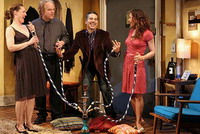"View From 151st Street " off-Broadway play grips attention from start
In an off-Broadway play "A View From 151st Street" a drug deal goes awry in Harlem and an undercover police officer and a street thug are shot. The drug dealer then urinates on the cop as he lies motionless on the ground.

The scene immediately shifts to the officer's apartment where his wife and sister - both teachers - are sharing stories of their schoolchildren's desperate lives. A detective buzzes the apartment from the street to tell Lena, the wife, about the shooting. Instinctively, she already knows.
Glaudini's play, wound tight as a coil from the start, is an exemplary look into the lives of people struggling on the fringes of New York. Distantly removed from the inhabitants of the gentrified city seen in most movies and TV shows today, his characters struggle with drug addiction, crime, hopelessness and the dangers inherent in living in poor, forgotten places.
This is the New York that former Mayor Rudolph Giuliani neglected to clean up - and Glaudini makes a point of showing that its ills are still very much alive.
Such a play could suffer from melodrama and sentimentalism, but "A View From 151st Street" illustrates the characters' problems without making you feel sorry for them. Glaudini brings the audience inside his protagonist's apartment and allows you to get to know him as a person, not a stereotype of a member of an inner city, minority community.
The result is a sobering portrayal of the cop Danny's painstaking rehabilitation from the shooting, with the help of his family, a Russian nurse and an old army buddy who is trying to reclaim his own life from a crack addiction.
Juxtaposed with Danny's story is that of the drug dealer, Delroy, whose grief from losing his cousin in the shoot-out causes him to become addicted to crack, as well.
The stories play out against a striking musical backdrop created by composer Michael Cain and musical director Paul Thompson. A three-piece jazz band echoes the disharmony in the characters' lives with musical interludes that heighten their feelings of anger, isolation and loss.
In one arresting scene, Delroy (played with fearlessness by Craig "muMs" Grant) goes on a drug-fueled rant - part rap, part slam poetry - about the public housing projects he's spent time in.
"Projects, seen a few, son, worked rock in one or two, son," he bellows, accompanied by a driving jazz beat from the band. "Frederick, Meltzer, Seeward Park, Crampton Villa, I'm a killa."
Grant's performance stands out in a cast filled with strong actors, including Gbenga Akinnagbe and Andre Royo (both from HBO's "The Wire"), and Liza Colon-Zayas and Elizabeth Rodriguez, both regulars of the LAByrinth Theater Company, which produced the show.
If there's a weakness in the play, it's that Glaudini wrote a difficult role for Juan Carlos Hernandez (Danny) to play. Hernandez is somewhat inconsistent, melding different interpretations of brain-injury patients, from those struggling with speech to those relearning basic motor functions and recovering their memories.
Danny's speech returns in spurts, then recedes, and it's difficult to keep up with the progress of his recovery. His character, while holding together the powerful supporting cast around him, is the least believable of the bunch.
Subscribe to Pravda.Ru Telegram channel, Facebook, RSS!


